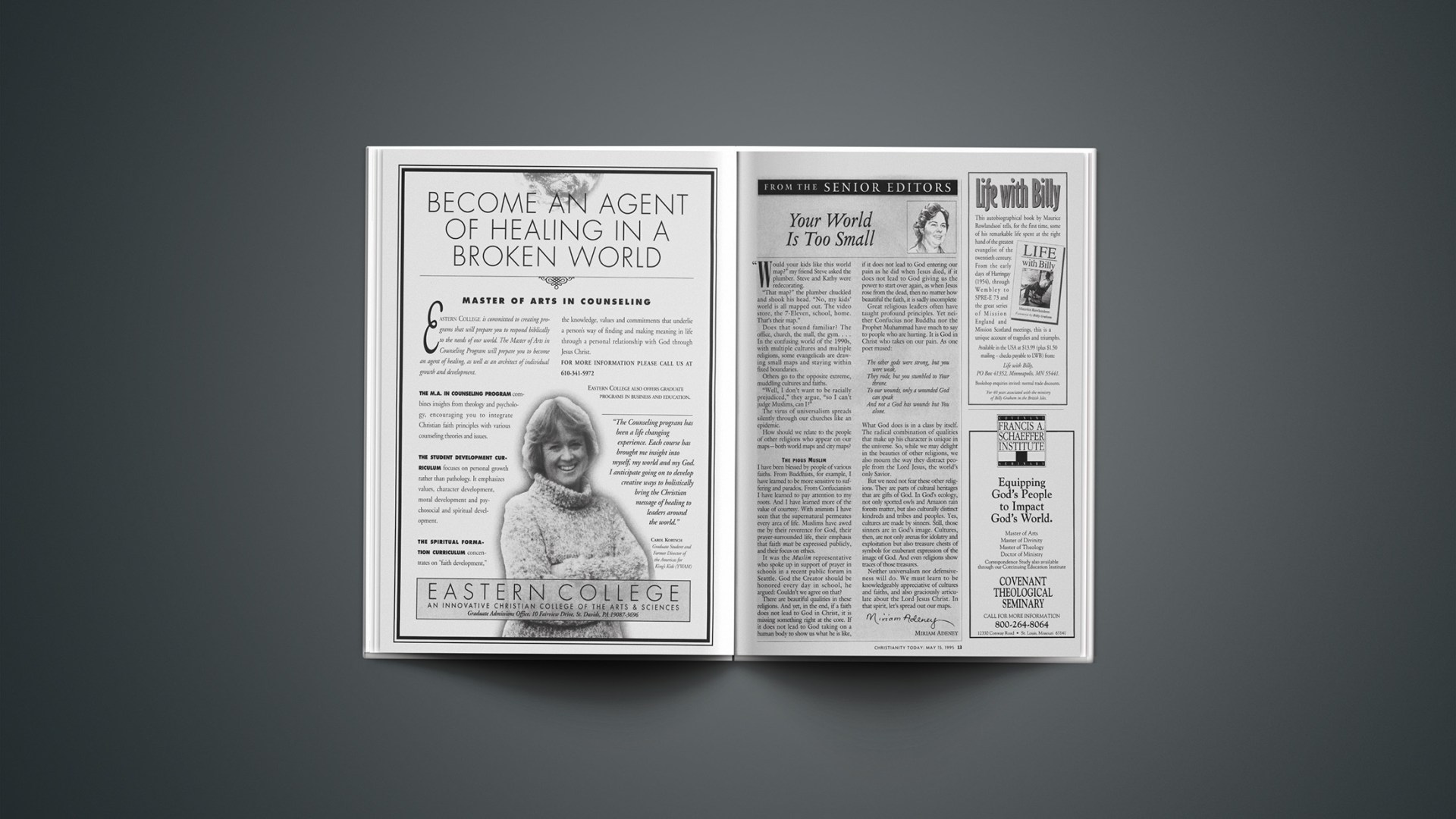Would your kids like this world map?” my friend Steve asked the plumber. Steve and Kathy were redecorating.
“That map?” the plumber chuckled and shook his head. “No, my kids’ world is all mapped out. The video store, the 7-Eleven, school, home. That’s their map.”
Does that sound familiar? The office, church, the mall, the gym … . In the confusing world of the 1990s, with multiple cultures and multiple religions, some evangelicals are drawing small maps and staying within fixed boundaries.
Others go to the opposite extreme, muddling cultures and faiths.
“Well, I don’t want to be racially prejudiced,” they argue, “so I can’t judge Muslims, can I?”
The virus of universalism spreads silently through our churches like an epidemic.
How should we relate to the people of other religions who appear on our maps-both world maps and city maps?
THE PIOUS MUSLIM
I have been blessed by people of various faiths. From Buddhists, for example, I have learned to be more sensitive to suffering and paradox. From Confucianists I have learned to pay attention to my roots. And I have learned more of the value of courtesy. With animists I have seen that the supernatural permeates every area of life. Muslims have awed me by their reverence for God, their prayer-surrounded life, their emphasis that faith must be expressed publicly, and their focus on ethics.
It was the Muslim representative who spoke up in support of prayer in schools in a recent public forum in Seattle. God the Creator should be honored every day in school, he argued: Couldn’t we agree on that?
There are beautiful qualities in these religions. And yet, in the end, if a faith does not lead to God in Christ, it is missing something right at the core. If it does not lead to God taking on a human body to show us what he is like, if it does not lead to God entering our pain as he did when Jesus died, if it does not lead to God giving us the power to start over again, as when Jesus rose from the dead, then no matter how beautiful the faith, it is sadly incomplete
Great religious leaders often have taught profound principles. Yet neither Confucius nor Buddha nor the Prophet Muhammad have much to say to people who are hurting. It is God in Christ who takes on our pain. As one poet mused:
The other gods were strong, but you were weak,
They rode, but you stumbled to Your throne.
To our wounds, only a wounded God can speak
And not a God has wounds but You alone.
What God does is in a class by itself. The radical combination of qualities that make up his character is unique in the universe. So, while we may delight in the beauties of other religions, we also mourn the way they distract people from the Lord Jesus, the world’s only Savior.
But we need not fear these other religions. They are parts of cultural heritages that are gifts of God. In God’s ecology, not only spotted owls and Amazon rain forests matter, but also culturally distinct kindreds and tribes and peoples. Yes, cultures are made by sinners. Still, those sinners are in God’s image. Cultures, then, are not only arenas for idolatry and exploitation but also treasure chests of symbols for exuberant expression of the image of God. And even religions show traces of those treasures.
Neither universalism nor defensiveness will do. We must learn to be knowledgeably appreciative of cultures and faiths, and also graciously articulate about the Lord Jesus Christ. In that spirit, let’s spread out our maps.
Copyright © 1995 Christianity Today. Click for reprint information.
ctmay95mhg5T60135508










